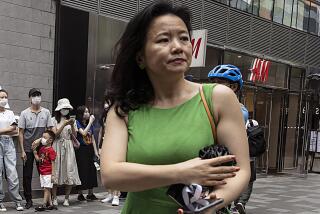China Allows Best-Known Dissidents to Leave
BEIJING — China’s best-known dissidents, physicists Fang Lizhi and his wife, Li Shuxian, left the country for Britain today after Communist authorities allowed them to end their yearlong refuge in the U.S. Embassy.
The White House immediately hailed Beijing’s move as a “humanitarian action” that will better U.S.-Chinese ties.
The 54-year-old astrophysicist and his wife had sought refuge in the embassy after the June 4, 1989, military crackdown on the pro-democracy movement.
The official New China News Agency said they were given permission to leave the country for medical reasons after showing “signs of repentance.”
It said the move was “in line with China’s policy of leniency toward those who participated in the disturbances” of last June.
Since late last year, China has announced the release of more than 800 people jailed for their participation in the democracy movement, but it is believed that thousands more remain in jail.
The White House said Fang and Li were bound for Britain aboard a U.S. C-135 air transport and would arrive in London early Tuesday. Spokesman Marlin Fitzwater said Fang had accepted a job at Cambridge University.
“This humanitarian action is a far-sighted, significant step that will improve the atmosphere for progress in our bilateral relations,” he said in a statement, adding that President Bush was informed of the development late Sunday.
He did not disclose when or how the agreement to allow the couple free passage had been reached.
Fang has been China’s most outspoken and eloquent proponent of democratic reform. He and Li were well known for their advocacy of democracy and human rights in China well before the seven-week pro-democracy movement jelled.
Hundreds of unarmed civilians were killed in the military assault on central Beijing and thousands of activists were subsequently arrested. Fang and Li did not play an active role in the student-led protests, but after the crackdown the Communist government accused them of inciting the unrest.
They took refuge in the U.S. Embassy in the days after the crackdown, and American diplomats refused to turn them over to Chinese authorities. Washington also imposed sanctions that cut shipments of military hardware and U.S.-Chinese relations deteriorated.
Their release appeared timed by the Chinese for maximum political results. The seven leading industrialized nations are to hold their annual meeting July 9-11 in Houston, and policy toward China is to be a major subject.
Congress is also debating Bush’s decision last month to extend most-favored-nation trading status to China for another year. The Fang case has been cited by some members of Congress demanding revocation of the status.
More to Read
Sign up for Essential California
The most important California stories and recommendations in your inbox every morning.
You may occasionally receive promotional content from the Los Angeles Times.










